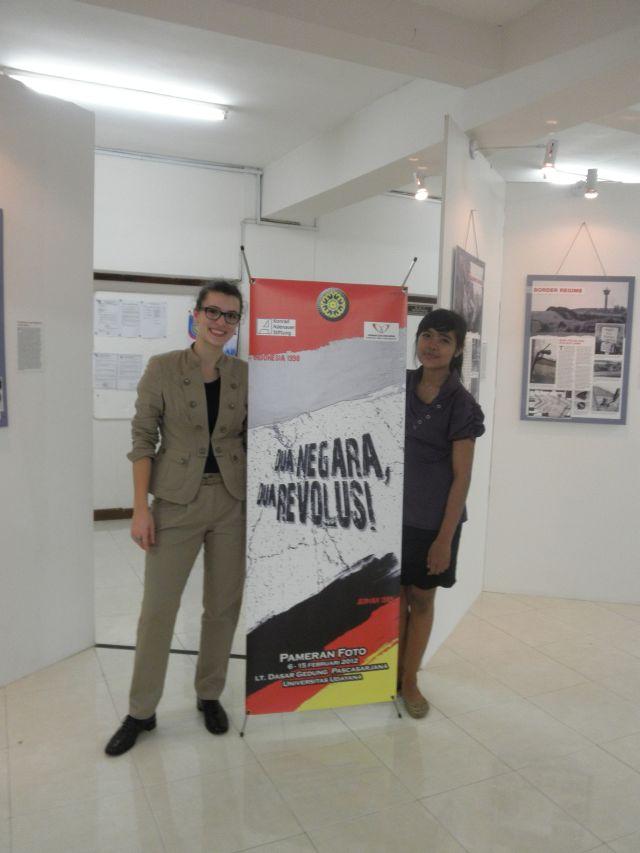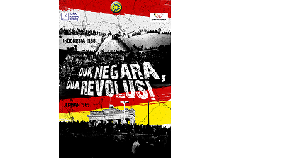Our Blog from Bali! - Foundation Office Indonesia and East Timor
On 6 February, the Konrad Adenauer Foundation hosted a public panel discussion on “Germany in 1989, Indonesia in 1998. Two countries, two revolutions”. Two students from Germany and Indonesia have blogged about their experiences. Read the first part here!
With a panel discussion on 6 February, the Konrad Adenauer Foundation opened an exhibition of the Berlin Wall. For KAS-Jakarta two students from Germany and Indonesia blogged about their personal impressions of the event. Read the first part here:
About walls and reforms
A blog by Ines Burghardt (University of Marburg)
A Balinese welcome
On Monday, 6 February, at the Udayana University in Denpasar, Bali, 150 Indonesian students and I experienced what one as a young person can learn from old walls and new reforms. The Konrad Adenauer Foundation opened, with a panel discussion, the exhibition “The Wall. A border through Germany”.
Podium and exhibition line up in the event program of JERIN (Jerman dan Indonesia/ Germany and Indonesia). Sixty years of diplomatic relations between the two countries was thus celebrated, visualized, and strengthened in many ways. From October 2011 till June 2012 more events under JERIN take place all over Indonesia.
The panel discussion presented Wimar Witoelar and Prof. Peter Schiwy, two full-blood journalists as discussion partners. The podium was completed by moderator Dr. Jan Woischnik, Director of the Konrad Adenauer Foundation for Indonesia and East Timor, as well as Prof. I Gede Putu Wirawan, Vice President of the Udayana University, who welcomed the participants. In addition, as supporting programme, the officials of Udayana University had organized a traditional Balinese dance show.
A meeting between contemporary witnesses…
The discussion, which dealt with the former inner German border and with the change of regime in May 1998 in Indonesia, thrived on the detailed and personal representation of both speakers. While Peter Schiwy said that he came to know of the fall of the wall when switching to the channel of the NDR (Norddeutscher Rundfunk/North German Radio), of which he was superintendent at that time, the upheavals in Indonesia reached Wimar Witoelar similarly surprising. None of them had expected such rapid changes. Especially for my generation, who has rather historical reference to the events, personal information like this is very exciting and valuable.
In the further course of the discussion it was pointed out that in many instances it was not possible to compare the developments in Germany in 1989 and in Indonesia in 1998. As Witoelar stated, for example, until now one could only speculate about the reasons for Suharto’s resignation. One must stick to the fact that Suharto himself had chosen to take this step. On the other hand, in the German Democratic Republic, the Government came under increasing pressure due to the peaceful Monday demonstrations. The opening of the wall has to be, according to Peter Schiwy, understood as a reaction to this.
The speakers discussed in particular, due to their profession, the roles of the media. Both regard an independent coverage of political transitional change phases as critical. Both have taken on completely different tasks after the turn of events. Whereas Wimar Witoelar, after the fall of Suharto, actively engaged in political events of the new developing democracy of Indonesia, in which he was the spokesperson of President Abdurrahman Wahid, Peter Schiwy saw his task more in the development of a new communication concept for the new eastern part of Germany.
Witoelar and Schiwy were therefore, as they repeatedly emphasized in the course of the discussion, surprised and happy about the radical changes in their home countries, although after the first euphoria Peter Schiwy had his fears too. He feared a subsequent reaction of the Soviet Union. His almost indifferent task of the GDR appeared to him, as born West Berliner, initially still very incredible.
...and bearers of hope
After both speakers had described their personal experiences, the discussion was opened for questions from the audience. These were on the one hand critically aimed at the speakers. On the other hand, in their estimate, people demanded more information on concrete historical events.
For example, one student expressed his concerns regarding the focus on political processes during the transition phase. In his opinion, the economic development must above all be involved. Both speakers agreed to the objection. Only through a multidimensional analysis could the events in Indonesia as well those in Germany be correctly understood.
Another question dealt with the role of civil society. A student inquired about the significance of an active civil society for political changes. In his opinion, the Indonesian citizens had indeed high expectations of the democratization process, which was not necessarily reflected in active participation. Also at this point, Peter Schiwy referred again to the Monday demonstrations in the former GDR, which were a good example of the far-reaching effect of active citizenship.
By the sound of a gong we start
The exhibition, which was developed by the Federal Foundation for the Reconciliation of the SED (Sozialistische Einheitspartei Deutschlands/German Social Unity Party) Dictatorship and the newspapers BILD and DIE WELT, was opened at the end of the discussion in the traditional Indonesian way by a gong by the respective speakers.
The exhibition highlighted in particular the SED dictatorship, and the escape attempts of those who did not want to submit to the regime. The “Wall Marksmen Cases” were also taken up as theme which after the fall of the wall enabled the prosecution of the perpetrators. Above all it represented everyday life in divided Berlin and explained the events leading to the construction of the wall. Altogether a comprehensive picture of the former GDR was illustrated, which ended with the reunification. The exhibition itself was open till 15 February at the Udayana University.
After the discussion many students were all attention in going through the exhibition or in trying to engage the speakers in conversation. Among these people was for example I Gusti Ngurah Gede A. P.. He got into a conversation with me, and said to have not known very much about the German separation and the reunification before the event. And now he got interested because of the discussion and the exhibition. In addition, the theme was extremely relevant for him as a student majoring International Relations. In his opinion, however, the two developments in Germany and Indonesia were hardly comparable. In the first case, it was about the taking down of a separation, whereas in Indonesia pure regime critic was voiced.
Similar concerns were also expressed by a female student from Udayana University, with whom I could have a conversation. Santhi Pradayini Savitri also spoke about the differences of both situations. Indeed, the population of both countries had been dissatisfied. According to her, it was here that the two movements met. I asked her about candid questions that she had brought to the exhibition. She said that it was not clear what after the fall of the Wall, or the fall of Suharto, were the biggest challenges for each successive government.
A job for tomorrow
It soon became clear that these questions are not so easy to answer. But perhaps, and I hope after this event, young people will take on this topic, in Indonesia as well as in Germany, because they form the civil society of tomorrow. It is their job to find out, whether the Wall has really taken down, or whether the democratic progress is really established. My dialogue partner Santhi Pradayini Savitri has cut right to the chase of the matter by asking the following question: “How can you as a young person not be interested in civil society and politically explosive issues, as for example the fight against corruption in Indonesia?” I can only associate myself with this question at this point. At the beginning of engagement in civil society is interest in civil society.





